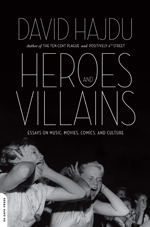Each day leading up to the March 11 announcement of the 2009 NBCC award winners, Critical Mass highlights one of the thirty finalists. Today, NBCC board member Craig Morgan Teicher discusses criticism finalist David Hajdu's Heroes and Villains: Essays on Music, Movies, Comics, and Culture (Da Capo)
David Hajdu is tough on contemporary music. He calls John Zorn “the living master of creative delusion.” He describes “the unapologetic commercialism of Taylor Swift's music.” Concluding his review of the long-awaited 2004 release of Brian Wilson's lost follow-up to the Beach Boys' seminal Pet Sounds, Hajdu says, “Smile, masterpiece or not, is still lost.” Hajdu is a skeptic—it takes a lot to impress him, and he is deeply interested in how an artist's own self-delusions can impede the realization of a musical vision. But, in thinking so hard about the juncture where personality and performance meet, Hajdu hears things in music most of us do not, the subtleties that are lost or are born in the gap between the sounds a musician thinks he or she is making and what a listener hears.
The central piece in this collection of essays and reviews (not just of music, but of cartoons, comics, movies, corporate culture, and online journalism) is an extended piece on Billy Eckstine, the jazz singer and bandleader whom Hajdu says “simply redefined what it meant to be black and a celebrity in America.” In tracing Eckstine's rise and fall, Hajdu finds a representative life for illustrating how a society can fail its geniuses, or the other way around, which is, in fact, the overarching subject of this book.
It's an ambitious project, and Hajdu proves his point through the details. There's an incredibly moving essay about Wynton Marsalis, who showed up in New York in the early '80s and quickly became the popular figurehead of jazz, only to tarnish his crown a decade later with his own inflexible standards. Hajdu is able to sweep away all of Marsalis's holier-than-thou criticism of younger musicians when he finds the trumpeter playing anonymously in a New York club, where it becomes clear that, in spite of himself, Marsalis can really blow his horn. Again and again, in pieces about figures as different as Ray Charles and Harry Partch, Hajdu is able to get the artist out of the way of the music. He'll send you back to your record collection—or your iTunes library—and, after reading Heroes and Villains, you'll hear better.
Click here to read an excerpt from Heroes and Villains.
The NBCC awards ceremony is free and open to the public, as are the readings by NBCC finalists on Wednesday, March 10. To purchase tickets to the reception following the awards ceremony, click here.


